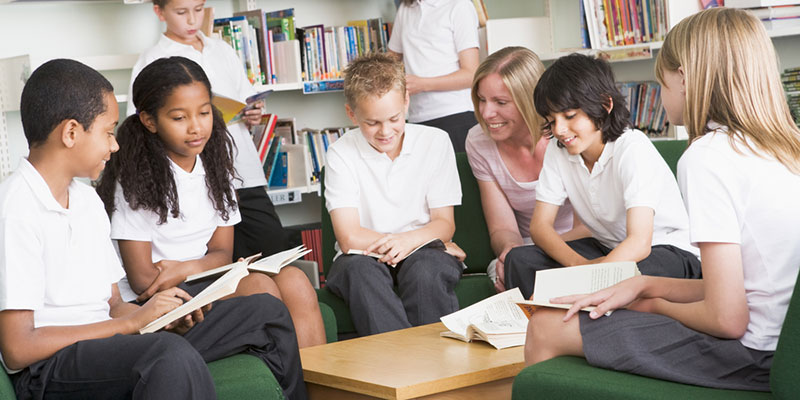Bournemouth University: Books and Stories
This is one of a series of case studies to accompany our Insight brief on schools, attainment and the role of higher education. It highlights an example of a successful partnership between schools, higher education providers and other organisations.

The challenge
The gap in attainment for disadvantaged pupils has closed steadily in recent years, but disadvantaged children remain on average, four months behind at the end of reception year and 11 months behind at the end of primary school.1 Research shows that reading has a positive impact on children’s attainment and that children who read for enjoyment have more positive attitudes towards reading than their peers.2 Reading is an essential element of education and necessary to improve social mobility.
The approach
Books and Stories is a targeted intervention developed by Bournemouth University in 2014. It aims to achieve demonstrable improvement in the reading ability of Year 6 pupils and advance their confidence in and attitudes towards reading.
10 weekly one-hour sessions are delivered in target schools across Bournemouth, Christchurch and Poole and Dorset. Each school is asked to identify up to 20 Year 6 pupils with reading ages that are over a year lower than their actual age, and who do not have a special education need. Bournemouth University then selects 10 pupils who would most benefit from the programme.
Each session is carefully structured to include a 30-minute guided reading session, followed by an interactive activity to develop reading comprehension skills tailored to meet pupils’ needs. These sessions are delivered in school time by Bournemouth University staff, with support from student ambassadors.
The main objectives of the programme are to:
- Support learners to develop specific literacy skills by the end of the 10-week programme, including improving their reading fluency and comprehension and expanding their vocabulary.
- Record a significant (six months or more) improvement in learners’ reading skills between the start and end of the programme, by comparing pre- and post-programme assessments, providing a standardised measure of their reading age.
- Reduce the attainment gap between disadvantaged and non-disadvantaged learners at Key Stage 2 at participating schools, and ensure participants achieve a level of attainment enabling higher education progression (as a long-term outcome).
Evaluation and results
To successfully evaluate the Books and Stories intervention the university uses a ‘Type 2’ evaluation approach according to the OfS standards of evidence, establishing a clear baseline from which to measure impact. Participating pupils complete access reading tests at the start and end of the programme to measure any difference in their reading age. Pupils also complete surveys about their confidence in, and attitudes towards, reading, before and after the programme.
Analysis of data from the 2019-20 cohort, where a total of 70 Year 6 pupils participated across seven schools, demonstrated the following positive findings:
- 67 per cent of pupils improved their reading age after participating in the 10-week programme. On average, pupils’ reading ages increased by 12 months.
- 38 per cent of pupils recorded an improvement to their reading age of two years or more.
- There was a 35 per cent increase in confidence for being a good reader.
- Pupils’ comparison of their reading ability relative to their peers improved by 44 per cent.
In addition, qualitative feedback obtained from pupils and teachers further demonstrated the positive impact on reading:
‘Books and Stories has taught me that you can get a little better at reading if you just read. I have read a book in the holidays for the first time.’
‘The difference in the children chosen to take part has been impressive. It has enthused them and given them a love of reading literature.’
The future
In addition to the continuous delivery by Bournemouth University, in 2021-22 the university is working with the local authority in Weymouth and Portland, having franchised the programme to it. The sessions will be delivered in 11 schools, led by teaching assistants and student mentors, all of whom have been given full training and access to programme materials. This has been cited in a recent Ofsted report for one of the participating schools as an example of their efforts to raise literacy standards.
The university’s long-term ambition is to grow the franchise alongside its own delivery, to reach more learners across the region, with the potential to grow nationally. This would allow it to strengthen its evaluation methods, and longer-term analysis with higher volumes of students with a wider geographical spread could form the basis for an even more compelling case study to be shared across the sector.
In spring 2021-22 the university is piloting ‘Maths Mates’, an equivalent programme for pupils in Key Stage 1 to improve maths attainment, with three local primary schools.
Notes
- Education Policy Institute, Divergent pathways: The disadvantage gap, accountability and the pupil premium, 2016.
- Clark, C, and De Zoysa, S, Mapping the interrelationships of reading enjoyment, attitudes, behaviour and attainment: An exploratory investigation, National Literacy Trust, 2011.
Describe your experience of using this website
